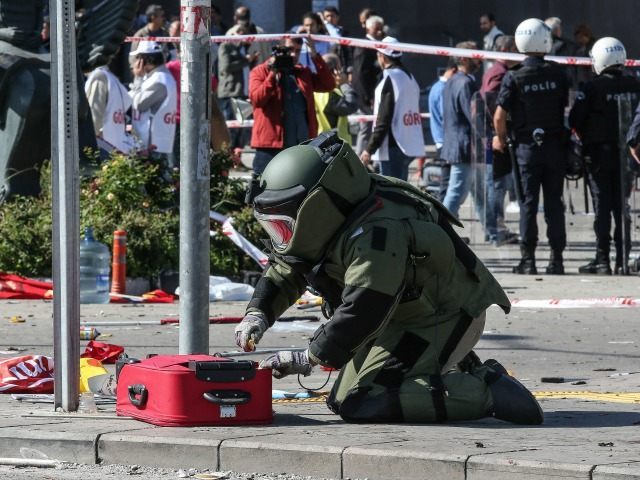Turkish media is reporting the first arrests directly in relation to Saturday’s twin bombings in the capital, Ankara: two suspected members of the Kurdistan Workers’ Party (PKK) who tweeted about the event before it occurred.
The arrests were reported just as police released more information on the identities of those found to be the suicide bombers in the deadliest terror attack in Turkey’s history.
Hurriyet reports that two men, who have not been identified, were arrested in relation to an anonymous Twitter account named @MrBereday, which posted messages hinting at a terror attack in Ankara before the bombings happened. “A bomb will explode in Ankara,” read one tweet, while another read, “What if ISIL exploded [a bomb] in Ankara?” The men are believed to have ties to the PKK, a Marxist terrorist organization designated as such by Turkey and the United States.
“In the demonstration that will be held in Ankara, there may be an intervention under the name of ISIL. The way to prevent this is a direct intervention of leftist organizations. The PKK is not in this affair,” another tweet read, which appeared to attempt to distance the PKK from the attack, but does not answer how a PKK affiliate would know of such an attack given that the two groups are enemies.
Turkish Prime Minister Ahmet Davutoğlu had initially told reporters that Turkish investigators consider the Islamic State prime suspects in the bombing, which targeted a peace rally consisting largely of Kurdish supporters of the Peoples’ Democratic Party (HDP), an opposition party in Parliament. Davutoğlu has stuck to that line even following the arrests of PKK members, suggesting the groups may have been working in tandem. “We are working on (investigating) two terrorist organisations, Daesh (ISIL) and PKK, because we have certain evidence regarding the suicide bombers having links with Daesh, but also some linkages with PKK groups,” he said Tuesday in an interview in Istanbul. He added the Revolutionary People’s Liberation Army-Front (DHKP-C), a violent Marxist group, to the list of suspects, as well.
“As the investigation deepens, and based especially on certain results we have obtained through Twitter accounts and IP addresses, we can see that both Daesh [the Arabic acronym for ISIS] and the PKK are groups that are likely to have played an active role,” Davutoğlu added on Wednesday.
With the Turkish government releasing the names of the men believed to have committed the suicide bombings in Ankara, the ties to the Islamic State are clear. The men have been identified as Yunus Emre Alagöz and Ömer Deniz Dündar, both with ties to ISIS. Alagöz’s brother was found to be the perpetrator of a similar attack in the city of Suruç, targeting Kurds en route to the Syrian town of Kobani to provide aid to civilian victims of ISIS violence. The Suruç attack prompted Turkey to launch airstrikes against both ISIS and the PKK in Syria.
Dündar had traveled to Syria at least twice to train with the Islamic State, his father told reporters, insisting that he had contacted authorities to ensure his son was arrested.
Cooperation between the PKK and ISIS would upend months of violence between the two groups. The PKK cooperates extensively with Kurdish YPG and YPJ militias in Syria and operates independently in Iraq against the Islamic State, and is widely considered among the most effective forces against ISIS. While the United States maintains that it will support legitimate Kurdish forces, but not the PKK, some on the ground fail to see the difference. Said one PKK fighter to the Wall Street Journal: “Sometimes I’m a PKK, sometimes I’m a PJAK, sometimes I’m a YPG. It doesn’t really matter. They are all members of the PKK.” The PKK’s success against ISIS has made it a popular group among young would-be Kurdish guerrilla members.
The Ankara bombings on Saturday, October 10 left 97 dead and is considered the deadliest terrorist attack in the history of post-Ottoman Turkey.

COMMENTS
Please let us know if you're having issues with commenting.